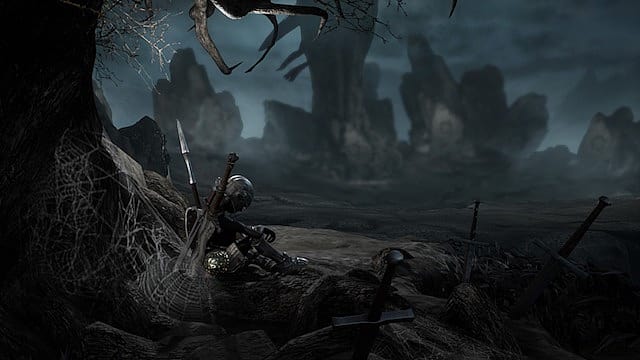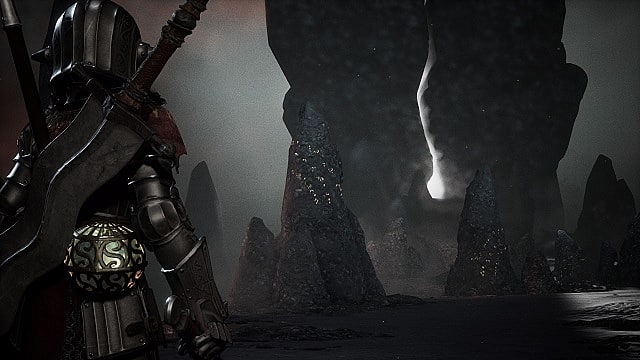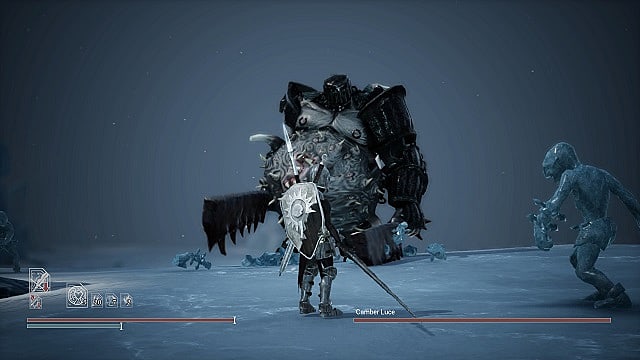

Difficult, gut-punching games have always existed. Contra, Ninja Gaiden, Ghosts n' Goblins. In countless ways, these classics and others like them have undoubtedly led to millions of broken controllers over the years. Employing complex gameplay elements and punishing design, these games have served as predecessors to the catalog of games that make up the masocore subgenre.
Masocore titles pride themselves on kicking you in the teeth and taking your lunch money for fun, making it perhaps the most radical gaming subgenre because it is often -- and quite literally -- painful to play.
Over the past nine years, the now infamous Souls series has taken masochism to popular new heights, focusing on unrelenting enemies, unforgiving environments, and, at times, seemingly unfair boss battles. The grandiose nature of the series, coupled with exploitative feedback loops, have fetishized the grandiosity and pleasure of triumph against all odds.
While it is one of the most rewarding subgenres in gaming, masocore's not for everyone, that much is certain. In fact, it's a genre that often spits in the face of fun, taking players to the brink of utter madness.
Such is the case with Sinner: Sacrifice for Redemption. Employing the most masochistic parts of the Souls series and amplifying them, Sinner is a gauntlet built solely to test your patience and resolve. It doesn't give a damn about your expectations, much less your feelings.
If you're a fan of the difficult games, this probably sounds enticing. It was for me. The only catch is that while it downright nails certain aspects of the Souls formula -- emulating them almost pixel for pixel -- Sinner also stumbles in important ways, leaving the light of its greatness to die slowly in the shadows.

A Landscape of Mixed Emotions
On the surface, Sinner: Sacrifice for Redemption shares the darkly brooding atmosphere of the Souls series. Much of its world is obviously inspired by it. But pay closer attention and it becomes clear that there's something anachronistic about the design. A Dark Souls: Kawai, if you will.
It's telling that my first reaction to the game was "This is what Dark Souls would have looked like had Nintendo developed it first." There's a strangely cutesy vibe ingrained into the character design that doesn't quite mesh with the macabre surroundings and dire narrative.
While that's not in itself a damning statement, it is a detriment when you realize the inexact tone rumbles on throughout the game, seemingly unaware of its own imprecision.
Aside from a few truly ghastly moments, Sinner doesn't seem to understand the missing link between what it aspires to evoke with its aesthetic and what it actually portrays. The tonal schism is only exacerbated by bland, un-engaging environments juxtaposed to the serious grandiosity promised by the initial set up and subsequent narrative.
One of the only true caveats to my dismay comes in the form of Lustful Chanel, an initially uninspired boss design mirroring blueprints from the Souls series. However, it's one that quickly descends into terrifyingly appropriate nightmare fuel, warranting a response that can only be summed up by this picture made entirely of Shia LaBeoufs.
There are good things to be found in the environments, such as Angronn's anxiety-inducing lava arena that slowly breaks away as the boss gets angrier and angrier; and the swampy, phallic-rock filled poison pit that is Faiz Talus' stage.
The start screen is also well done, seamlessly transitioning into the game at the press of a button. It's a small detail but one that works effectively at drawing the player in from the beginning.

Utterly Unforgiving, Ultimately Unfair
If it's not obvious at this point, much of the gameplay found in Sinner: Sacrifice for Redemption plays out exactly as it would in a Dark Souls game -- right down to the game's lock-on mechanic.
Rolling and parrying are important mechanics that require quick mastering. Light attacks deal small but stinging bits of damage, while heavy attacks dole out more severe punishment at slower intervals. Of course, you can block, but the mechanic is largely irrelevant as soon as you find it has little positive effect when fighting most of the game's eight bosses (pro-tip: rolling is just that much more efficient).
When you start the game, you'll go through a quick tutorial on all of the mechanics at your disposal, fighting specters along the way to Sinner's level hub. Since this is a boss battler, the tutorial is one of the very few times you'll actually fight any mobs in the game, save for a very (very) small handful of bosses that have minion waves, so take the opportunity to brush up before moving forward.
Eventually, you'll come to a place very reminiscent of the nexus found in Demons' Souls (and one that made me initially exclaim with optimistic delight). However, the portals here that lead to each of the boss stages act as nothing more than loading screens between the hub world and the boss arenas -- there are no stages to go through, there are no obstacles to overcome, there are no enemies to defeat beforehand.
Simply, you're tossed into the arena like a weary gladiator forced to face Goliath after Goliath.
It's obviously something you might expect from a boss battler -- giant slayer is practically in the name after all. But the rote repetition of spawning right at the boss becomes an issue when you're not properly rewarded for your efforts, something that makes pushing through fight after fight more and more exhausting with every attempt.
I had initially been excited with the prospect of tackling something with the opposite "grind" of Dark Souls maps, but not having the option to defeat enemies for rewards prior to facing the ultimate goal quickly felt unfulfilling.

And that feeling is tied up in one of the game's core mechanics.
When you select a boss to fight from the initial nexus, you must sacrifice something to access its arena. Some sacrifices nullify your health regeneration, while others diminish your attack power or remove important items from your inventory.
These sacrifices stack from boss to boss, making the game harder and harder with each victory. You can't remove them, either, if you're planning on fighting the final boss; reclaiming sacrifices re-spawns bosses, and you need to defeat them all (and keep them that way) to unlock the final confrontation.
In some ways, Sinner is a lot like Mega Man, where there's an optimal path from one boss to the next. But unlike every other boss battler or masocore grind fest I've ever played, Sinner doesn't give you a damn thing for all your efforts. After each victory, your overall health increases. That's it.
There are no other weapons to get. There are no other armor sets to get. There are no other items to get. You don't receive more stamina and you don't receive any special buffs for your fights against other bosses. This, as plainly as I can say, is the most disappointing part about Sinner: Sacrifice for Redemption.
There are negative feedback loops and then there is the Sinner feedback loop, one in which you'll feel unjustly rewarded time and time again. As the debuffs stack, the only thing you'll gain is pride in saying "I beat them." Even Mega Man, Cuphead, and Dark Souls reward you with new weapons, abilities, items, and armors as you play.
Sinner literally gives you nothing. If you get stuck on a boss, it's very easy to lose all motivation to forge ahead.
I may sound like a big, fat whiner, but it's so demoralizing that only the most hardcore will make it through to the end -- if they can get past the crushing difficulty of the later bosses stacked with removable debuffs and without a single ounce of help.

Verdict
As much as I've opined about the design of Sinner: Sacrifice for Redemption, it's not all bad. It does feel good to learn the quirks of each boss and finally beat them; the opening area is adequately gloomy, and the music is mostly memorable.
On top of that, the controls are tight and responsive, and aside from a few difference, mostly familiar for Souls veterans, making this a pick-up-and-play title for the most part.
Sinner: Sacrifice for Redemption isn't a bad game, but instead one that doesn't quite feel finished -- or, more accurately, one that doesn't live up to its potential. With a certain polish missing from the whole that bleeds over into its various parts, Sinner feels like an average -- if unforgiving -- boss battler cashing in on the popularity of From Software's juggernaut.
The initial hook is there, but it never digs in to really snag its catch. I want to love this game, but the more I play it, the harder that becomes. For Souls fans and masocore aficionados, Sinner is a seven- to 10-hour scratch for that incessant hardcore itch. But after that, you'll find yourself still yearning for the real thing.
[Note: The developer provided a copy of Sinner: Sacrifice for Redemption for the purposes of this review.]
0 comments:
Post a Comment